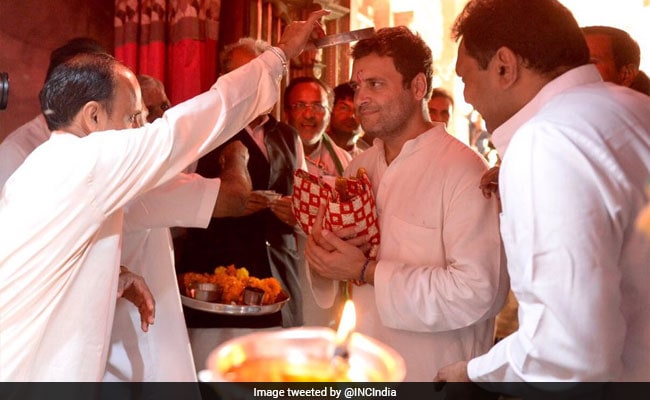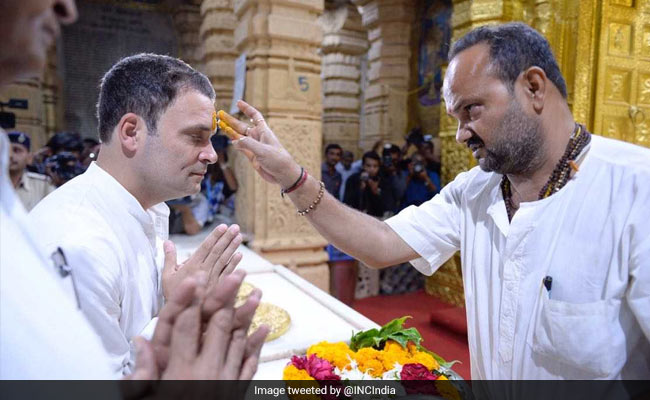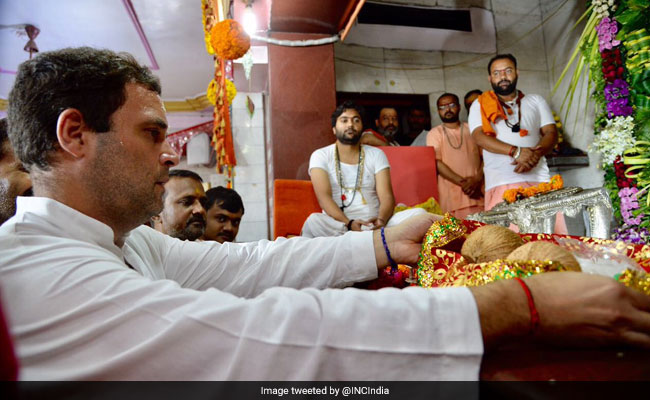It may be premature to suggest that under his tutelage, the Congress party shall shed its hard-line secularist tag, which was widely criticized for becoming shorthand for minority appeasement. Whether this was only a tactic for neutralizing the BJP's Hindu edge in a state often called the "laboratory of Hindutva" or marks a deeper change in ideological predilection remains to be seen. Having gone quite far in asserting his Hindu identity for the first time since entering politics, the Gandhi scion will find it difficult to backtrack. There is no doubt that this transformation helped the Congress to duck the BJP's regular allegation that the Nehru-Gandhi family is not only non-Hindu in its beliefs but also anti-Hindu in its politics.

Congress president Rahul Gandhi at Khodiyar Mataji Mandir in Varana, Gujarat
If Rahul Gandhi sticks to his newly-discovered identity he would, in a sense, be taking the Congress back to its pre-Nehru avatar. Till his great-grandfather became Prime Minister and overwhelmingly dominated the Congress party after the death of Vallabhbhai Patel, the Congress was widely seen as essentially a Hindu party as distinct from the overtly religious Muslim League which was busy agitating for Partition through violent means.
Any student of modern Indian history would know that British administrators defined the Congress as such, despite Nehru's loud protestations of secularism being the party's inalienable creed. But despite all his attempts, Muslim voters opted for the League in the 1936-37 elections held under the Government of India Act of 1935. In UP for example, the Congress won a huge mandate but could not ensure the victory of even a single Muslim candidate. A stalwart like Rafi Ahmed Kidwai too lost at the hands of a young League contender. The 1946 elections to the Central Legislature (the franchise was still limited), replicated the same result. Although bitterly disappointed, Gandhi, Nehru and Patel had to reluctantly concede without saying as much that Jinnah had indeed won his argument that the Muslim League was the "sole spokesman" of his community. Jinnah treated Congress Muslim leaders such as Maulana Abul Kalam Azad and Kidwai with disdain even referring to them disparagingly as "showboys".

Rahul Gandhi at the Somnath Temple in Gujarat
The Muslim appeasement tag seriously stuck to the Congress in the aftermath of Rajiv Gandhi overturning the Shah Bano verdict through his brute parliamentary majority in 1985. To offset this, the relatively young Prime Minister ordered the opening of the locks of the Ram Janmabhoomi in Ayodhya where idols of Ram Lalla had been placed in 1949 under the domes of the Babri Masjid. The rest of course is well known and Hindutva sentiment spiraled unchecked thereafter. The Congress decided to soft-pedal the matter instead of confronting the rising tide of Hindu assertion. But in the late 1990s and since the beginning of this century, the Congress party's image was decidedly coloured by a hard-line secularist tinge.

Rahul Gandhi at Chamunda Mataji Temple in Chotila, Gujarat
Rahul Gandhi seems to have acknowledged the importance of making that distinction and asserting his personal identity as an upper caste Hindu without hesitation. This will undoubtedly help him, and by extension the Congress party, shed the anti-Hindu label that got affixed to it in recent years. To that extent, post-Gujarat, it is a more level field than before, in which individual religiosity can coexist with a different public persona. If Rahul Gandhi persists with this, the Congress may regain its old identity and even echo the position that India is secular because its dominant creed is Hindu. But for that, Rahul Gandhi must demonstrate that his two dozen-odd temple visits in the course of the Gujarat campaign were not superficial showpieces but had deeper conviction.
In other words he would need to continue visiting shrines (of various faiths) without appearing to do so for purely political ends. A deeply religious country like ours appreciates believers, and dislikes agnostics. By establishing his identity as a believer, Rahul Gandhi has an opportunity to shed a burden he has carried for long.
(Dr. Chandan Mitra is a journalist, currently Editor of The Pioneer Group of Publications. He is also former BJP MP, Rajya Sabha.)
Disclaimer: The opinions expressed within this article are the personal opinions of the author. The facts and opinions appearing in the article do not reflect the views of NDTV and NDTV does not assume any responsibility or liability for the same.


